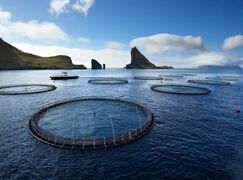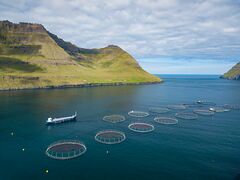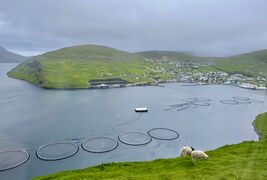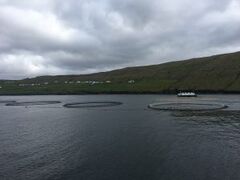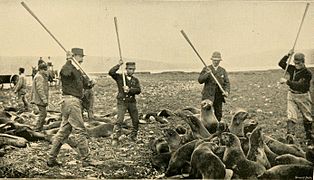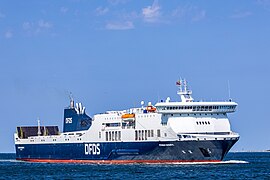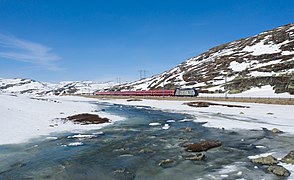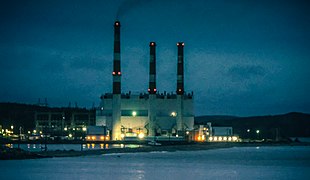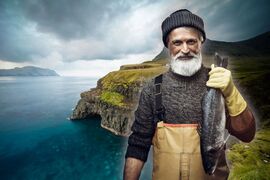Nauta Normand: Difference between revisions
Tags: Mobile edit Mobile web edit Advanced mobile edit |
mNo edit summary Tags: Mobile edit Mobile web edit Advanced mobile edit |
||
| Line 406: | Line 406: | ||
===Fishing, fisheries, and hunting=== | ===Fishing, fisheries, and hunting=== | ||
Fishing and whaling account for 75% of the economic activity by value on Nauta Normand. | Fishing and whaling account for 75% of the economic activity by value on Nauta Normand. The predominant fish caught in the area are cod herring and halibut which make up 80% of the fish caught in the economic exclusion zone of the islands. Most of the fish is exported and the primary export markets are [[Kiravia]], [[Faneria]], [[Yonderre]], and [[Burgundie]]. | ||
Most of this fishing occurs outside of the economic exclusion zone of the islands by the distant-water fishing fleet stationed on the island. These deep sea trawlers operate in international waters and are not regulated by any laws or treaties. They work primarily in the [[Coscivian Sea]], the [[Kilikas Sea]], the northern [[Ocean of Odoneru]], and the [[Albion Sea]]. These areas are also used by the wailing Fleet stations on the island. This fleet primarily hunts for wright whales, humpback whales, and sperm whales. The whale blubber, meat, and oil are sold all over the world to willing markets. | |||
====Aquaculture==== | ====Aquaculture==== | ||
| Line 420: | Line 417: | ||
File:Burg fish pics 06.jpg | File:Burg fish pics 06.jpg | ||
</gallery> | </gallery> | ||
Due to international backlash around overfishing in the 1990s and early 2000s, a lot of money and infrastructure was invested into aquaculture, specifically sustainable technologies. Aquaculture now makes up almost 20% of all of the fish exported from the islands. Aquaculture continues to be an area of investigation and investment for the islands. The primary fish grown by the aquaculture sector is cod and halibut. | |||
===Artisanal/heritage industries=== | ===Artisanal/heritage industries=== | ||
Revision as of 10:41, 17 May 2024
Nauta Normand | |
|---|---|
Province of Burgundie | |
| Nickname(s): The Northern Sailor, Hyperborea | |
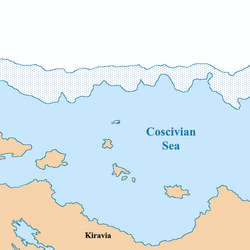 Map of Nauta Normand | |
| Nation | |
| Constituent Country | Burgoignesc Overseas Territory Assembly |
| Geographic designation | Polar Burgundies |
| Capital City | Soix |
| Area | |
| • Total | 854.696 km2 (330.000 sq mi) |
| Population | |
| • Total | 142,960 |
| • Density | 170/km2 (430/sq mi) |
| Demonym(s) | Normandiennes |
| Website | www.burgundie.gouv/nautanormand |
Nauta Normand is an over-seas province of Burgundie located in the eastern Coscivian Sea. It shares a maritime border with Kiravia to the south. It is part of Burgundie's Burgoignesc Overseas Territory Assembly's Polar Burgundies geographic designation. It is home to 142,960 Normandiennes. It's capital and largest city is Soix which also serves as the province's largest port facility.
Nauta Normand is known for its hard-nosed residents who brace the elements every day to live on the desolate and barren landscape. It is however a critical naval and scientific outpost for Burgundie which are the two largest sectors of the economy. Because of the focus on science, the Normandiennes are incredibly well educated and their Internet speeds are fastest in Burgundie, averaging around 3gigs. The Normandiennes are predominantly focused on traditional lives fishing, herding, weaving, and what little agriculture can be eeked out, but the youth are preferring to go to Kiravia and the Burgoignesc Metropole in greater and greater numbers. To make up for this, larger and larger numbers of immigrants are being given incentives to move to Nauta Normand to maintain these cottage industries which is being met with mixed reactions from the locals.
History
Politics and government
Nauta Normand is part of the Burgoignesc Overseas Territory Assembly's Polar Burgundies geographic designation. Burgoignesc Overseas Territory Assembly is a constituent country equivalent of Burgundie with its own assembly, prime minister, budget, and laws. Burgundie's national governmental influence is limited to subsidies, education, and security, however, its financial and cultural institutes cast a long shadow across Nauta Normand.
Nauta Normand is a province within Burgoignesc Overseas Territory Assembly with its own semi-elected Governor-Epistates, representative legislative body, and court system.
Nauta Normands are Burgoigniacs/Burgoignix with complete civil and economic rights, and citizenship (political rights) under the same federal service criteria as all residents of Burgundie. Burgoignesc is the official language but Coscivian and Burgoignesc are both in use.
Provincial executive
The provincial executive is the Governor-Epistates. Three candidates are elected by a single transferable vote election held every 5 years, the three candidates are presented to the Court of St. Alphador and the next Governor-Epistates is chosen from these candidates. If the citizenry rejects the selection, a run-off election is held with the remaining two candidates.
Provincial legislature
Like the Citizens Court of the National Assembly (Burg. La Assemblee de Ciutadans de l'Assemblee Nacional, ACAN), The Nauta Normand Citizen's Court of the Provincial Assembly is a unicameral legislator. It makes provincial law, has the power of the provincial purse, and has the power of impeachment, by which it can remove sitting members of the provincial government. The Assembly has three seats for each province, one for the Burgoignesc Overseas Territory Assembly's Nauta Normand liaison, 3 for the clergy, 3 seats reserved for municipal leaders, and 3 for a rota of private business leaders. On 6 occasions throughout the year 3 more seats are opened to the public to debate topics that are not on the annual legislative agenda.
Military
| St. Devereaux Naval Station Coscivian Sea Joint Maritime Patrol Station | |
|---|---|
| Near Soix in | |
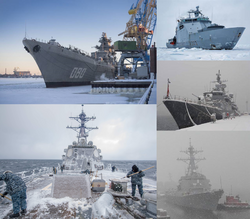 | |
| Site information | |
| Owner | Burgoignesc Security Forces |
| Operator | Navy of Burgundie |
| Condition | Operational |
| Garrison information | |
| Occupants |
|
Nauta Normand falls under the Navy's Kilikas Command, the Army's Boreal Command, the Royal Air Service of Burgundie's Boreal Command, and the Vocivine National of Burgundie's Coscivian Sea Command. The Navy_of_Burgundie and the Vocivine are the only services that maintain a permanent presence on the island. The fleet ships of the Navy and submarines of the Vocivine are stationed at St. Devereaux Naval Station. Some elements of Battle Squadron North Star and Sustainment Group Tundra Timber are permanently stations in St. Devereaux. The Boreal icebreaker fleet is also stationed at St. Devereaux Naval Station. 8 icebreakers are stationed here, and they are used to conduct sovereignty patrols but also to clear the shipping lanes for cargo ships coming to and from Port Soix.
Every able-bodied resident of Nauta Normand, over 18 and under 65, is conscripted into the Normandienne Fencible Regiment of Marine Infantry (Burg:'Regiment Fencible du Normandiennes d'Infantrie Marine (RFNIM)) of the Navy of Burgundie which requires that the citizens act as a ready reserve force, ensuring that the Army of Burgundie does not have to maintain a garrison on the islands. The RFNIM is also a functional universal basic income to support the population as the economy is shrinking the youth are moving to Kiravia or the Burgoignesc Metropole.
Emergency response and healthcare
Law enforcement
The three national-level law enforcement agencies are all present on Nauta Normand, however, they have a comparatively small presence. To keep the local economy stimulated the Police Joint-Forces Boreal Training School is in Nauta Normand which serves the Gendarmerie, the Constabulary, and the Revenue Guard. This school is designed to teach survival, tracking, riot control, simple boreal combat maneuvers, and cultural accessibility training for arctic deployments. The
National Gendarmerie

Nauta Normand is under the jurisdiction of the Nauta Normand Battalion of the Borealis Brigade of the Overseas Gendarmerie Division. The Nauta Normand Battalion has 3 companies and an HQ section.
- A Company is assigned to Nauta Normand with a specific mandate to protect the capital Soix and the Port of Soix.
- B Company is assigned to the remainder of the islands. They are based in Vollande, on l'Ile de Brume.
- C Company is assigned to security for the Port of Soix and the Noralea Pier.
- The HQ section is also based in Soix.
Each company are equipped with both trucks and hovercraft to brave the snow in the winter in the event of an eminent threat. They are also useful to support local emergency response, including search and rescue, medivac, evacuation, extraction.
National Constabulary
Nauta Normand is under the jurisdiction of the Nauta Normand Battalion of the Borealis Brigade of the Overseas Constabulary Division. The Nauta Normand Battalion has 2 companies and an HQ section.
- A Company is assigned to Nauta Normand.
- B Company is assigned to the remainder of the islands. They are based in Rettaque, on l'Ile Marianne.
- The HQ section is based in Soix and shares a headquarters with the Gendarmerie.
Revenue Guard

Revenue Guard, Metaborealis Station is co-located in St. Devereaux Naval Station. It consists of the 7th Cutter Pod and the Burgo-Kiravian Joint Life Saving Squadron. The 33rd is equipped both rescue cutters and hovercraft. In the winter with medivac via helicopter is impossible, they work with local ambulance dispatch to cross terrain more quickly and to medivac people to the appropriate level of care.
Vice
Firefighting

Ambulance

Sociolance
Healthcare
Nauta Normand is serviced by 10 clinics, 6 pharmacies, 1 surgery, and one level III hospital. Those needed a higher level of care are airlifted to Kiravia where a reciprocal agreement allows islanders to receive care in Kiravia at the Government of Burgundie's expense.
Geography
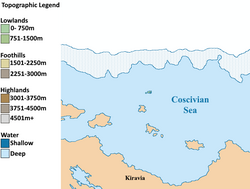
Nauta Normand consists of 4 islands, Nauta Normand being the largest, the two to the southeast are called The Little Twins (Burg: Les Petites Jumelles), and the larger island to the southwest is called Ile of Mist (Burg: l'Ile de Brume).
Nauta Normand is 699.297 square kilometers is mostly coastal plain in the north with a small rising plateau along the southern coast. Les Petites Jumelles, approxiamtely 32km off of the southeast, are 25.9 sqkm (Clarabelle) and 51.7 sqkm (Islebelle), separated from each other by a channel about 16km wide. L'Ile de Brume, 40km southwest of Nauta Normand, is 103.6sqkm.
Climate and environment
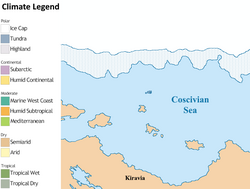
Polar climate
| Climate data for 1981–2010 normals | |||||||||||||
|---|---|---|---|---|---|---|---|---|---|---|---|---|---|
| Month | Jan | Feb | Mar | Apr | May | Jun | Jul | Aug | Sep | Oct | Nov | Dec | Year |
| Average high °C (°F) | −13.5 (7.7) |
−13.0 (8.6) |
−7.5 (18.5) |
0.0 (32.0) |
5.6 (42.1) |
11.0 (51.8) |
14.9 (58.8) |
15.8 (60.4) |
11.5 (52.7) |
5.1 (41.2) |
−1.3 (29.7) |
−8.1 (17.4) |
−1.7 (28.9) |
| Daily mean °C (°F) | −17.6 (0.3) |
−17.4 (0.7) |
−12.5 (9.5) |
−4.6 (23.7) |
1.5 (34.7) |
6.4 (43.5) |
10.1 (50.2) |
11.0 (51.8) |
7.5 (45.5) |
2.1 (35.8) |
−4.4 (24.1) |
−11.8 (10.8) |
−2.5 (27.5) |
| Average low °C (°F) | −21.6 (−6.9) |
−21.8 (−7.2) |
−17.4 (0.7) |
−9.1 (15.6) |
−2.5 (27.5) |
1.8 (35.2) |
5.3 (41.5) |
6.1 (43.0) |
3.4 (38.1) |
−1.0 (30.2) |
−7.5 (18.5) |
−15.4 (4.3) |
−6.6 (20.1) |
| Average precipitation mm (inches) | 14.1 (0.56) |
12.0 (0.47) |
13.1 (0.52) |
13.7 (0.54) |
13.0 (0.51) |
15.0 (0.59) |
16.0 (0.63) |
15.4 (0.61) |
15.4 (0.61) |
14.6 (0.57) |
13.8 (0.54) |
14.1 (0.56) |
170.2 (6.71) |
| Average rainy days (≥ 1.0 mm) | 1.82 | 1.73 | 2.55 | 2.91 | 3.18 | 2.73 | 3.82 | 3.45 | 3.27 | 2.36 | 3.09 | 2.55 | 2.79 |
| Average relative humidity (%) | 84.43 | 83.73 | 84.33 | 83.58 | 81.11 | 77.57 | 79.02 | 79.35 | 75.29 | 75.24 | 82.63 | 84.49 | 80.9 |
| Mean monthly sunshine hours | 3.78 | 6.88 | 8.37 | 10.62 | 13.9 | 14.96 | 14.96 | 12.33 | 8.99 | 7.21 | 4.94 | 3.68 | 9.22 |
| Source: ur mum | |||||||||||||
Natural Hazards
Controversy
- Despite being illegal in Kiravia, abortion tourism is quietly on the rise. Because it is prosecutable under both Kiravian passport law (in federal court) and extraterritorial jurisdiction for Kiravian nationals (federal or provincial court) great pains are taken to conceal the true reason for the visit, and it has led to a rise in human smuggling in the Coscivian and Kilikas Seas. The Government of Burgundie has come out strongly against this practice and the Revenue Guard has increased its presence and anti-smuggling patrols in Wintergen and Nauta Normand as a result.
Economy
-
Sheep herding is a major economic driver
-
So is cattle herding, Hamish here is adorable
-
Ship yard for the fishing fleet
-
Ferries to Kirav
-
Whaling fleet
Standard of living
Employment
Because Nauta Normand's economy is a high-low mix of sectors from research to traditional fishing and herding, opportunities abound for Normandiennes at all skill and education levels, which has helped the islands maintain a fairly steady unemployment rate of around X% for the last decade. Burgundie's high emphasis on education translates to a particularly educated and skilled workforce, leading to lower unemployment compared to less educated countries in Kiro-Borealis. The islands' economic diversity cushions against overreliance on any single industry, which has demonstrably made the island more resilient during downturns. Since Burgundie strives for Total Economic Engagement and espouses equal rights and opportunities regardless of gender, race, ethnicity, ability, or background, Nauta Normand benefits from improved access to education and training, impacting employment prospects across various fields.
Agriculture
Agriculture is mostly impossible on Nauta Normand, however the Royal Botanical Gardens of Elyse are a large botanical garden, which also operates as a museum, as well as a large farm for low growing calcifuge. The plants are harvested and dried or their oils are extracted and are sold to pharmaceutical companies and cosmetic companies for use in their products.
There are minor farms that work in cold resist crops which include potatoes, carrots, turnips, and cabbage, but they are only a small portion of the total food market on Nauta Normand.
There are some greenhouses that were established in the 1970s and '80s where some food for sustenance is grown to ensure that there is a balance of vegetable fiber and nutrients in the diets of those in Nauta Normand, however these are very expensive to operate and the food grown in these hydroponic greenhouses is typically more expensive than that imported from Kiravia. As such, This food is heavily subsidized by the government to try to enforce its competitive competitiveness in the grocery market and large swabs of land in the southern islands have been dedicated to this process. These greenhouses were nationalized in the late 1990s because the private owners and co-ops who had initially started them could not afford to maintain them. Since the 2020s additional technology has been engaged, specifically the use of AI, to ensure that these greenhouses are as efficient as possible This is allowed the price to come down marginally, but it is still a cost center for the government. The crops grown in these greenhouses are chosen for their nutrient density specifically plants like potatoes, lettuce, spinach, kale, broccoli, as well as cauliflower, and certain types of legumes. Potatoes in particular were abandoned after nationalization in the early 2000s because of a glut of potatoes imported by Canespa and Kiravia was able to make them not cost efficient and allow the people of now to Normand to have easy plentiful and cheap access to that plant.
Tourism and hospitality
Tourism is a minor part of now to Norman's economy but it does have a couple of key factors. There are a number of boreal tours operated out of the islands that specifically focus on glacier tours and boreal sea life watching. Recreation on the islands for tourists are based around snowshoeing, cross-country skiing, dog-sledding, boreal exploration as well as big game hunting specifically for walruses and seals. There are a series of small resorts on the island that are focused on the eco tourism set.
Mineral extraction
Mineral extraction used to be a primary focus for the island of now to Normand however the singular iron mine in the area became non-profitable in the 1980s and has since been closed. There are minor oil and gas deposits within the economic exclusion zone of the islands which were heavily exploited from the 1960s until the early 2000s. They have since dried up and while there is a small economic sector around oil and gas extraction, this has been reduced down to only two rigs in the current day. All of the output of these two rigs goes directly to the thermal power plant on the island but additional fuel is imported to meet the demands of power.
Fishing, fisheries, and hunting
Fishing and whaling account for 75% of the economic activity by value on Nauta Normand. The predominant fish caught in the area are cod herring and halibut which make up 80% of the fish caught in the economic exclusion zone of the islands. Most of the fish is exported and the primary export markets are Kiravia, Faneria, Yonderre, and Burgundie.
Most of this fishing occurs outside of the economic exclusion zone of the islands by the distant-water fishing fleet stationed on the island. These deep sea trawlers operate in international waters and are not regulated by any laws or treaties. They work primarily in the Coscivian Sea, the Kilikas Sea, the northern Ocean of Odoneru, and the Albion Sea. These areas are also used by the wailing Fleet stations on the island. This fleet primarily hunts for wright whales, humpback whales, and sperm whales. The whale blubber, meat, and oil are sold all over the world to willing markets.
Aquaculture
Due to international backlash around overfishing in the 1990s and early 2000s, a lot of money and infrastructure was invested into aquaculture, specifically sustainable technologies. Aquaculture now makes up almost 20% of all of the fish exported from the islands. Aquaculture continues to be an area of investigation and investment for the islands. The primary fish grown by the aquaculture sector is cod and halibut.
Artisanal/heritage industries
Sealing and walrusing
Further: Seal hunting and Walrus hunting
-
Historic approach to sealing, 1880s
-
Sealing ship
-
Sealskin waistcoat
-
Sealskin books
The northern coastal communities of Oilieur, Norville, Cotecress all engage in the legally protected heritage seal and walrus hunting industry. They do it for the meat, blubber, skins, and walrus tusks. A limited number of tourists can also hunt them as big game.
On average they hunt and process 47 tones of meat and blubber.
Furrier
Science and research
Manufacturing
Creative industries
Sports and leisure
Hovercraft regattas
Summer and winter circuits
Trade
| Port Soix | |
|---|---|
 | |
| Location | |
| Country | |
| Location | Nauta Normand |
| Details | |
| Opened | 1868 |
| Type of harbor | Intermodal freight port |
| Available berths | 2 |
| Piers | 3 |
| Employees | 164 |
| Statistics | |
| Vessel arrivals | 64 (seasonal, June-September) |
Port Soix is the cargo port for Nauta Normand. Due to the polar climate of the island, the port is only accessible from June to September. The workers of the port spend most of the year maintaining the port through the winter, but there is a feeding frenzy in the summer months to import all of the the food and commodities that are needed for the year. The port is smaller and most of the ships are transshipped through Kiravia. As a result, there is a contingent of the Revenue Guard focused on customs enforcement.
The Port of Soix is designed around short-sea shipping small feeder ships sized vessels. There is a container terminal, a tanker pier, and a break-bulk berth. The port is serviced by a bunker fuel depot and a climate controlled warehousing complex.
Noralea Pier
| Noralea Pier | |
|---|---|
 | |
| Location | |
| Country | |
| Location | Nauta Normand |
| Details | |
| Opened | 1974 |
| Type of harbor | unpaved pier |
| Piers | 1 |
| Employees | 4 |
During the summer months a fleet of small feederships conduct cabotage between Port Soix and Noralea to bring much needed supplies to the northern fishing communities not connected by road or rail. Community members will go to Noralea in their hovercraft and pick up supplies for the winter.
Infrastructure
Maritime
-
-
-
-
RORO to Kiravia
-
More ROROs
-
Inter-island ferry
The Hyperboreal Ferry Service (owned and operated by Lansing Lines) operates out of Hivernille and has daily ro-ro passenger/vehicle ferry service to:
Lighthouses
Rail
-
Train in summer
-
Train in spring
Torlen uses Standard gauge, 1,435 mm (4 ft 8+1⁄2 in) for both freight and passenger rail.
Borail (a portmanteau of boreal and rail) is the is the public-private joint-venture, intercity, passenger rail operator in Nauta Normand and Wintergen. It owns and operates all rail corridors, rights of way, and rolling stock that serve this purpose.
Roads
In the deep winter roads in the rural areas are covered and hovercraft and snowmobiles are the primary mode of transit.
Air
Energy and electricity
-
Thermal powerplant
-
Waste to energy plant
The BORA Waste to Energy Compact went into effect in 2027 with construction of a Waste to Energy power plant starting in 2028. The one plant built in Nauta Normand generates approximately 104,000 kWh/day with a waste reduction capacity of 110,000 kg/day.
The thermal energy plant has a generating capacity of 624.5 MW. It was placed in service in 1971 with two 150 MW units. A third 150 MW unit was added in 1980 to increase the output to 450 MW. In 1988/1989 the original two units were modified to increase the plant capacity to 490 MW. In January 2014, six–1.825 MW diesel generators were installed for the purpose of providing black start power. In 2015, a 123.5 MW diesel combustion turbine was installed.
Phone service and internet
Phone service is provided by Island Mobile, a co-op with a basic infrastructure layout, that covers the three main municipalities on the island. There are 11 cell towers that cover 84% of the population. Landline service is available and is still popular with those who live in the rural parts of Nauta Normand.
Highspeed internet service is provided by National Wireless Services a public-private ISP offered to areas of the Burgoignesc thalattocracy that don't have enough demand to create a competitive market. Residential internet speeds average 2 gigabits while commercial speeds are typically higher in the 3-4 gigabit range. National Wireless Services piggybacks on the Island Mobile towers and also has two towers of their own which provide highspeed wireless connections deep into the logging lands on the west of the island.
There is also a Global Maritime Distress and Safety System repeater and beacon on the island.
Demographics
See also
- Pages using duplicate arguments in template calls
- Pages with non-numeric formatnum arguments
- Pages using infobox settlement with possible nickname list
- Pages using infobox settlement with unknown parameters
- Pages using country topics with unknown parameters
- Burgundie
- Sub-national Regions in Burgundie
- Islands
- Burgoignesc islands
- 2024 Award winning pages


















